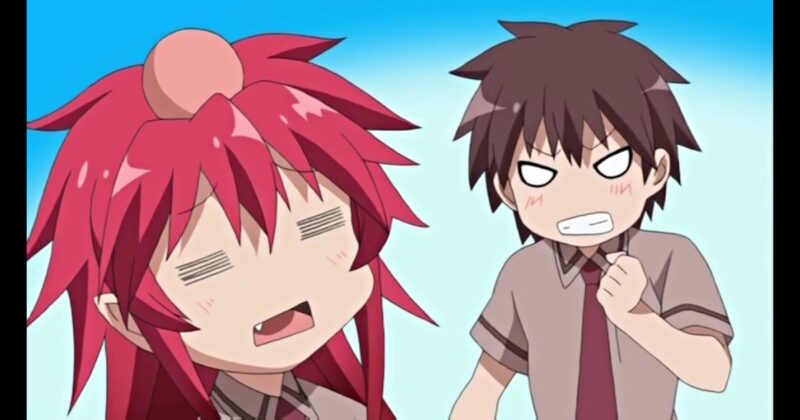
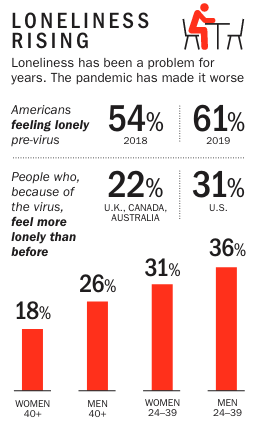
Many anime fans feel like I often beat up on the community. I don’t really beat up on it as much as point out problem areas. The only way to improve is to be aware of problems so you can address them. However, the anime community has many positive traits too. The most important trait is how the community offers an escape from loneliness.
Loneliness has links to depression, cognitive decline, heart problems, stroke, and many other health problems. The damage is similar to smoking 15 cigarettes a day among most people studied. In short, loneliness leads to an early death in the majority of people. It’s reduction in life expectancy is even worse than the impact obesity has on life expectancy (Russo, 2018; Ducharme, 2020).
Rates of loneliness have been increasing. The graphic Time (2020) offers shows the reported rates of loneliness in the US before and during COVID-19. Before the pandemic, 61% of people surveyed reported feeling lonely. While that is a staggering number, this survey includes fleeting moments of loneliness, which are natural. Still, the numbers are quite high even with this limitation.
Loneliness differs from being alone, what researchers call social isolation. Social isolation, when someone is content, doesn’t have the same level of health risks, although it still has some. Namely, living alone means no one else is around to help you remember to take your medicine or to help if you get hurt (Russo, 2018). You can feel lonely among people. According to Russo (2018), “loneliness is defined as perceived social isolation and the experience of being cut off from others.” Notice the role perception plays in that definition. Loneliness is a state of mind that creates chronic stress. And this chronic stress is what causes health problems.
Chronic stress is the “pathological state that is caused by prolonged activation of the normal acute physiological stress response, which can wreak havoc on immune, metabolic, and cardiovascular systems” (Prousky, 2020). In small, short doses, stress is fine. When stress never ends, such as chronic feelings of loneliness, the normal response becomes destructive. Prousky (2020) offers a chart of behaviors that both cause and signal chronic stress:
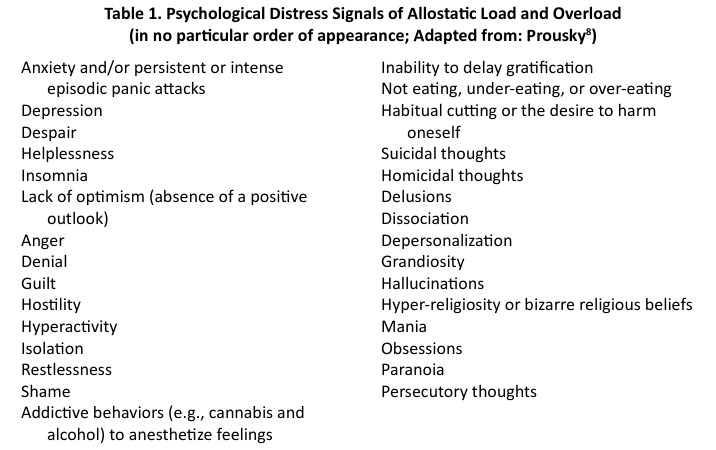
Thoughts and behaviors can cause and come from chronic stress. For example, feelings of loneliness may spark you to cut yourself. In turn, cutting yourself reinforces feelings of loneliness. Depression can cause you to withdraw from people, and loneliness can cause depression. This feedback cycle reflects in how chronic stress changes the brain. Chronic stress damages the health of connections between neurons in the hippocampus and other areas. It decreases synaptic output which hurts your ability to think well, control yourself, and remember things. The reduction in neural connections and output leads to behavior outlined in Prousky’s chart, which in turn causes the neural reduction (Prousky, 2020).
Fortunately, changes in the brain can be reversed by shifting perception and behavior. Loneliness is a perceived sense of social isolation. Realizing you aren’t socially isolated, even when alone, and socializing more will stop and reverse the feedback loop. You can also help yourself by unplugging from social media. High social media use leads to stronger feelings of loneliness among young adults and teens (Ducharme, 2020). Yes, social media causes loneliness. I can attest to how much better I feel since I quit all social media.
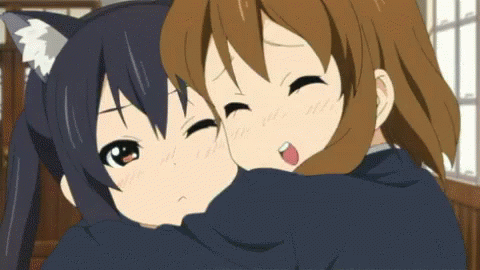
Now it seems strange for me to say being a member of the anime community can help with loneliness, considering how social media is, to be blunt, bad for your mental health. However, the studies of social media focus on Facebook, Twitter, and other similar outlets. Interestingly, message boards (old-school forums and blog comments–not social media) appear to increase feelings of support and belonging rather than creating feelings of loneliness (Hanley, 2019). The anime community generally focuses on discussing mutual interests in anime and manga. The feelings of solidarity surrounding a particular story or character helps offer a sense of belonging. This belonging, in turn, decreases the perception of social isolation.
The anime community offers a window that allows people to break the feedback cycle loneliness causes. The shared interest allows for easier discussion. It allows online friendships to form. Once the perception of loneliness reduces, stress reduces. When stress reduces, the brain can begin to heal.
The interactions inside the anime community can help change your thinking for the better too. That is my goal for JP. Once you shift your thinking, the signals and habits of Prousky’s chart begin to shift too. Even small shifts can great improvements in welfare. Yes, discussing why a certain waifu is better than another can help mental health if done right. Nudges can lead to larger changes as neurons begin to function better, allowing a positive feedback. Neuron reconnections allow better thinking, better self control, and better memory. This leads to better habits which allows for better neuron health. Small nudges are more effective than trying to make a large change. Large change is hard. Talking about a favorite anime in a forum or commenting on a blog, is an easy nudge away from loneliness.
Connection is the best trait of the anime community. Despite the negative aspects I often write against, the community remains a net positive for those who write on forums, write blogs, comment, and otherwise be a part of the world of anime and manga.
References
Ducharme, Jamie (June 22, 2020) A Plague of Loneliness. Time Magazine.
Hanley, T., Prescott, J., & Gomez, K. U. (2019). A systematic review exploring how young people use online forums for support around mental health issues. Journal of Mental Health, 28(5), 566–576. https://doi-org.oh0164.oplin.org/10.1080/09638237.2019.1630725
Prousky, J. E. (2020). The Stressed Brain – A Clinician’s Perspective: Part 1. Townsend Letter, 447, 70–73.
Russo, F. (2018). The Toxic Well of Loneliness. Scientific American, 318(1), 64–69.

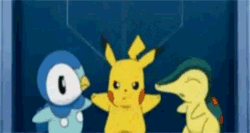

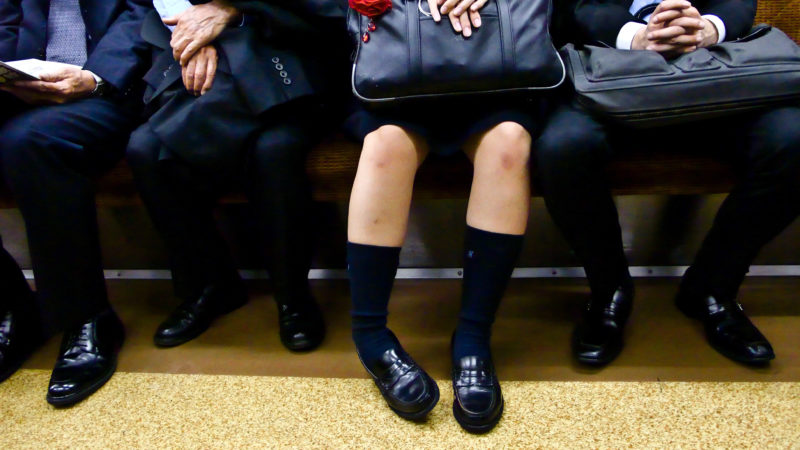
I have been dealing with loneliness for around a decade now and have been working to get out of that, but during that time I have been reading about loneliness and what you shared is align with what I have read about it. I especially like when you said that loneliness is “a perceived sense of social isolation” as it does show that one can choose to get out of this mentality instead of believing they are just stuck with it.
Now concerning social media I find it interesting that message boards and blog comments do a better job with fostering a sense of belonging then mainstream social media, but given what you shared would you say it has to do with the fact that mainstream social media are more generalist compared to forums and blogs which could be consider more specialist ? It seems that way when I think about it as from what I observe from people who use facebook and twitter they just follow random people without taking the time to get to know them. It’s like it’s more about quantity then quality. However when it comes to forums and blogs because those platforms can be design to focus on specific topics they could lead to attracting people with a similar interest of that topic together. Also what would you say about groups on facebook? Because I think if that is the case then facebook groups may be an exception since much like message boards and blogs those spaces can also be catered to a specific group of people and thus foster a better sense of belonging for people who interact in those groups compared to if someone was just using Facebook typically, as in not interacting with a group but just sharing photos, liking comments, following random people , etc.
I like to be alone, as I’ve written in several posts, and rarely feel lonely when I am. Being alone is quite different from feeling lonely. When COVID locked down my area for nearly 2 months (not too long after I was newly single again), I experienced joy, peace, and productivity. It shifted my perspective, and it made me want to retire right now :D.
The research I’ve read points to our tendency to compare ourselves to others–often to sanitized, curated illusions of others as shown on social media. People who use social media tend to substitute in-person relationships for social media time. However, people who use social media to organize in-person events don’t appear to suffer the ill-effects of social media use. I suspect these two reason (among other reasons such as advertising) point to why social media is toxic. Facebook groups might be better, but to get to the groups, you still have to deal with the toxicity and advertisement pushes Facebook asserts. I believe you are right about forums and message board’s specificity as to why they are helpful. They also don’t push the fear-of-missing-out as an advertisement ploy as social media does. The toxicity of advertising is why I refuse ad offers for JP (other than some product demos) and why I run a Pi-hole and browser adblockers. I block around 90-95% of advertising. While I know it isn’t good for creators, I have to project my mental health.